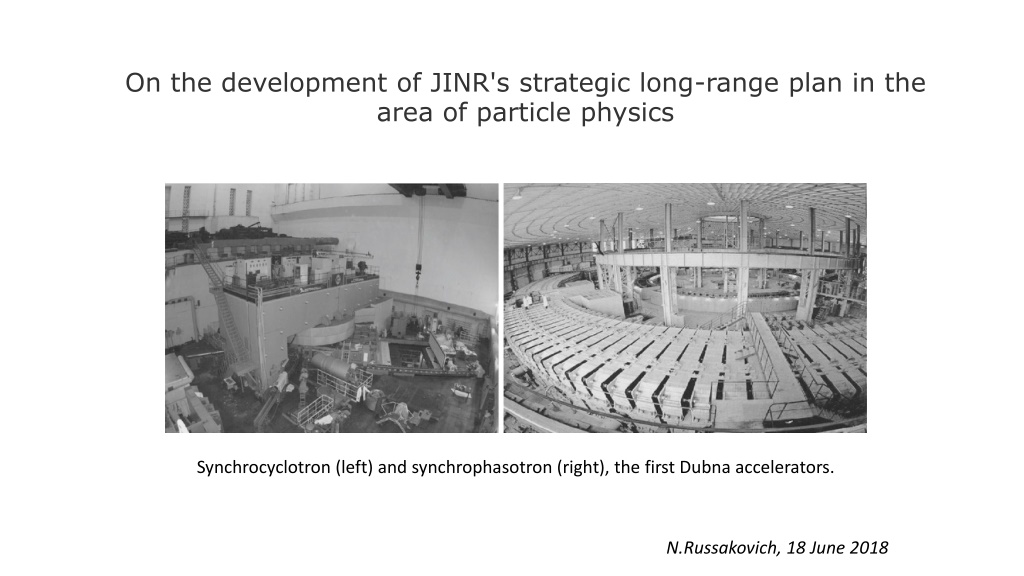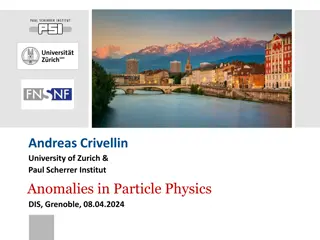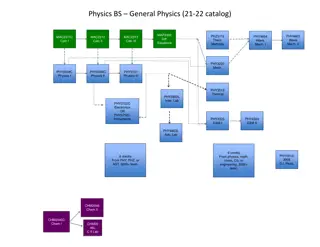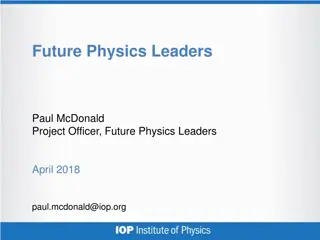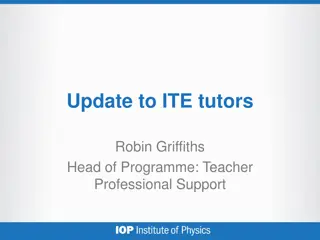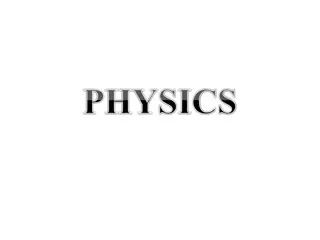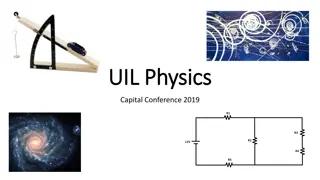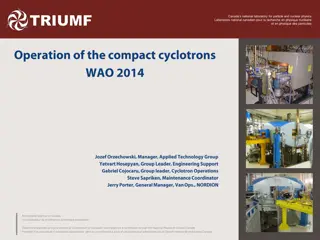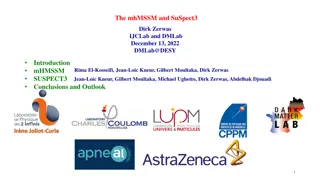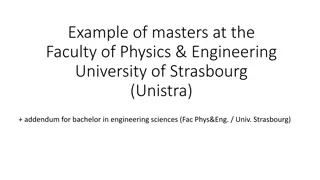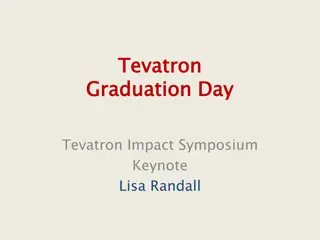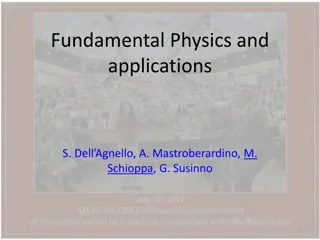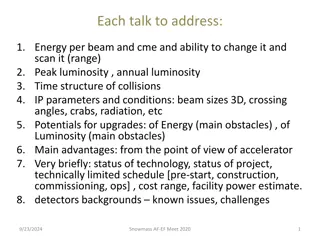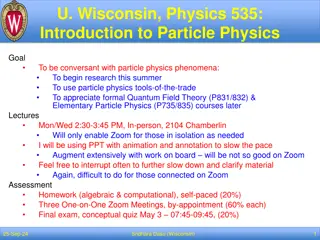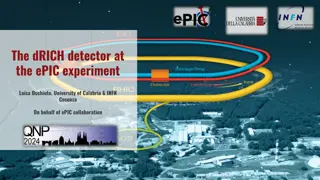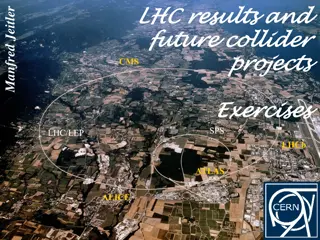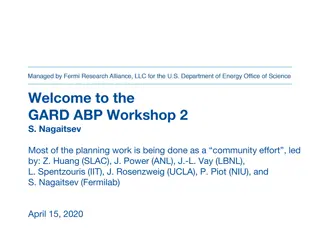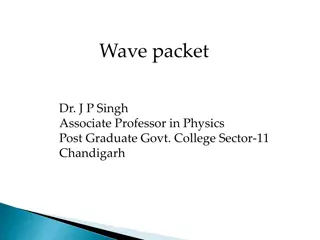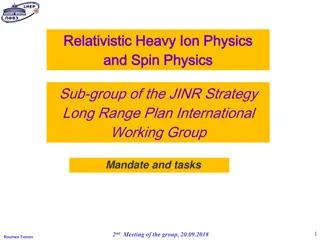Strategic Focus in Particle Physics Development
JINR's strategic long-range plan in particle physics emphasizes elementary particle research, with a primary objective to obtain crucial results from international experiments, such as understanding the Higgs boson and exploring new physics realms. The plan also outlines long-term goals for developing ultrahigh-energy particle accelerators, potentially leading to the construction of advanced accelerator complexes.
Download Presentation

Please find below an Image/Link to download the presentation.
The content on the website is provided AS IS for your information and personal use only. It may not be sold, licensed, or shared on other websites without obtaining consent from the author.If you encounter any issues during the download, it is possible that the publisher has removed the file from their server.
You are allowed to download the files provided on this website for personal or commercial use, subject to the condition that they are used lawfully. All files are the property of their respective owners.
The content on the website is provided AS IS for your information and personal use only. It may not be sold, licensed, or shared on other websites without obtaining consent from the author.
E N D
Presentation Transcript
On the development of JINR's strategic long-range plan in the area of particle physics Synchrocyclotron (left) and synchrophasotron (right), the first Dubna accelerators. N.Russakovich, 18 June 2018
Sub-groups and local conveners Particle Physics (including neutrino- and astrophysics, HEP on large scale international facilities) - Nikolai Russakovich (Nikolai.rusakovitch@cern.ch) and Vadim Bednyakov (bedny@nusun.jinr.ru) Relativistic Heavy Ion and Spin Physics - Roumen Tsenov (roumen.tsenov@jinr.ru) IT, Big Data and High Performance Computing - Vladimir Korenkov (korenkov@cv.jinr.ru) Condensed Matter and Neutron Nuclear Physics - Victor Aksenov (aksenov@nf.jinr.ru) Nuclear Physics at low and intermediate energies (including nuclear chemistry, nuclear astrophysics and atomic physics) - Alexander Karpov (karpov@jinr.ru) Radiobiology (including astrobiology) - Evgeny Krasavin (krasavin@jinr.ru)
V.Bednyakov, N.Russakovich co-chairs High energy Particle Physics: L. Cifarelli,M.Jezabek,E.Rabinovici,H.Stoecker Neutrinos and Astrophysics M.Spiro, V.Rubakov ,D.Naumov The first working meeting is planned for August 9th in Dubna, and the second one will be attached to the session of the JINR SC in September.
Extractions from the Draft Concept of Strategy for JINR Development (V.Bednyakov, N.Russakovich): Emphasis is placed on elementary particle physics because it takes the central place in the JINR research programme due to its fundamentality and underlies both the world view and the methodology of all researches carried out at JINR, ranging from quarks, nucleons, and nuclei to molecules and entirely new materials. Particle physics stimulates the work of the JINR scientists in such related fields as information, communication, and computing technologies, radiochemistry, polymer, condensed matter, and complex compound physics, radiobiology, genetics, etc. Thus, the main (first, near, until 2030) strategic objective of JINR in the field of elementary particle physics is to obtain, through full-scale participation in the international ATLAS and CMS experiments at the proton energy of 13 to 14 TeV (RUN-II LHC), fundamentally important results concerning the nature of the Higgs boson, properties of elementary particles (top quark), structure and main characteristics of quark gluon QCD matter, existence of new physics at the TeV energy scale, such as supersymmetry, extra dimensions of space, new types of particles and interactions, etc.
In the longer term (after the LHC, after 2030) the JINR objective in this field (ultrahigh- energy particle accelerator physics) can be double faceted. 1) In the most optimistic case and when there are no fundamentally new methods for production of particles with extremely high energies, JINR is quite capable of getting down to construction of an entirely new advanced accelerator complex for record man- made energies on its territory, like the FCC at CERN. This will ensure high attractiveness of JINR for both the Member States and the whole world. 2) In a more realistic case, when there is no way to construct an adequate home facility, the JINR objective is to ensure its maximum effective participation in the top-level international projects at new colliders and new experimental facilities at CERN, in China, United States, Japan, etc. Here the problem of choice is aggravated by low interest of the Member States in investigations at future facilities through JINR . On the other hand, JINR shares at CERN are high now, mainly due to an appreciable contribution from JINR to the LHC project. Therefore, it seems strategically important to try to convince the CERN administration to grant the future FCC collider the status of a partnership project of two international centres, CERN and JINR, thus making discussions of the necessity to choose between the two organizations devoid of grounds, and also to lay the basis for the long-term strategic development of this direction at JINR.
Next, according to the new JINR Neutrino Programme, the main objective is to ensure the leading position of JINR in neutrino physics and astrophysics, the most fundamental and rapidly developing area of modern physics, both through the astrophysical researches at the unique BAIKAL GVD neutrino telescope and multifaceted (basic, applied) investigations with antineutrino beams at the Kalinin Nuclear Power Plant and through the decisive contribution of JINR scientists to the advanced international experiments (JUNO, EUREKA, etc.) and creation of the advanced research infrastructure in Dubna. More specifically, there are a few strategic objectives standing out: - Organization of real collaboration between the Baikal project and other large experiments in this field (IceCube, KM3Net) with developing the data exchange protocol and algorithms, holding joint workshops, etc. and creation on this basis of a global network for monitoring space in the neutrino channel with ensuring stable operation of this information channel within the multi-message investigation of space. Participation of JINR in the implementation of the international flagship multipurpose neutrino project DUNE in the United States (together with CERN). Participation of JINR in the European project SKA (Square Kilometre Array Telescope), first of all through processing and storage of large amounts of data within the rapidly developing Big Data Concept. - -
One more objective of JINR in the indirect search for new physics is to continue JINRs traditional investigations in flavour physics of quarks and leptons by fully participating in such world-class experiments as the study of the rare CP-violating kaon decay K and the precision search for muon-to-electron conversion on nuclei A eA. Till today we (VB and NR) have no additional input (yet) from the subgroup members, and hope to get them prior to the August meeting. Thank you!
